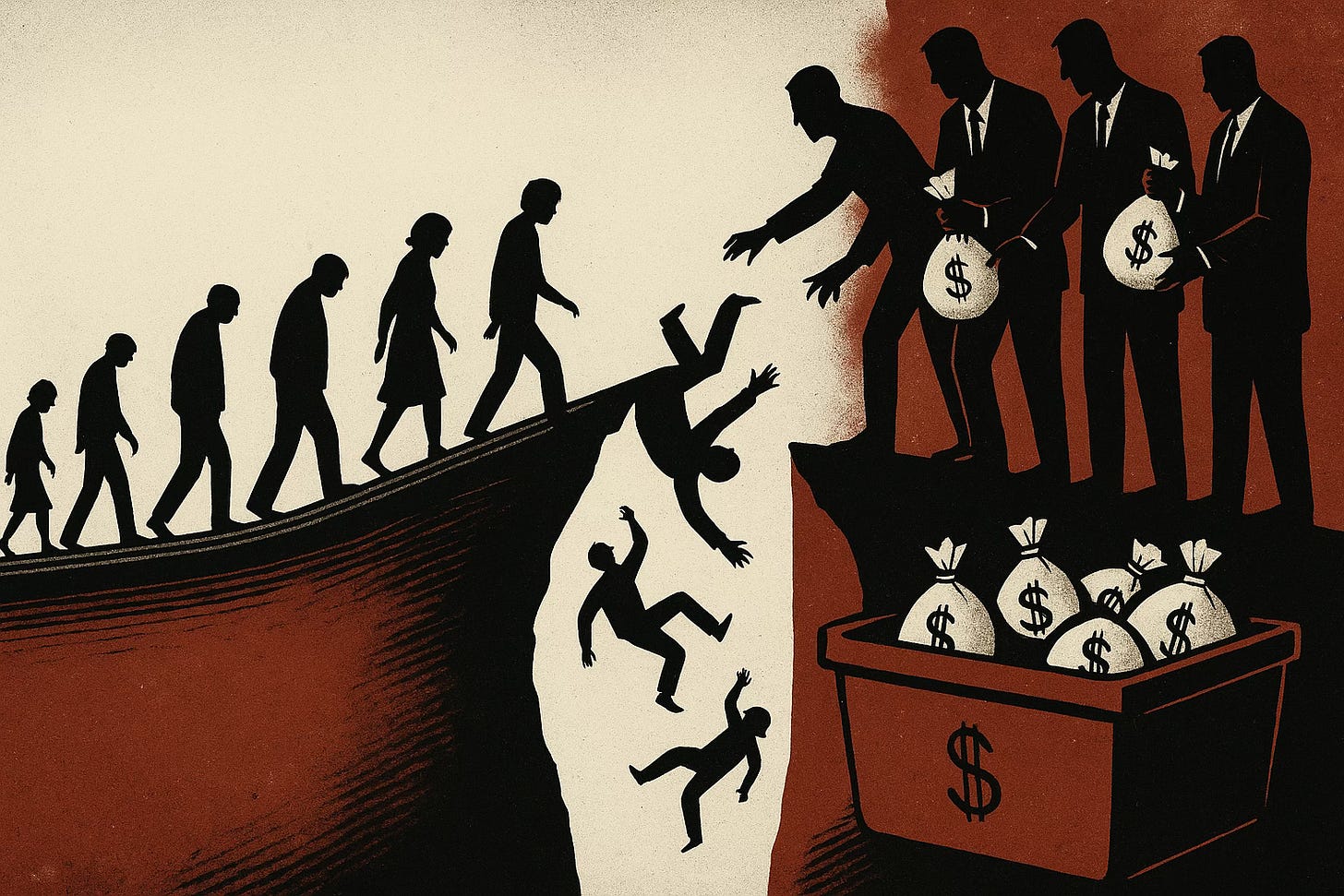Fiscal Suicide Pact
A $5 trillion debt bomb disguised as discipline
Something truly unsettling is unfolding in the halls of Congress. The so-called "One Big Beautiful Bill" isn't some well-intentioned effort to spur growth or enact meaningful reform. Make no mistake, this is a meticulously crafted blueprint, a deliberate and unapologetic instruction set designed to shunt resources upwards, all masked by populist rhetoric and the convenient shadow of an arbitrary deadline. What you're witnessing isn't legislation in the traditional sense; it's a financial redistribution mechanism, precisely engineered for maximum impact and minimal accountability.
The Congressional Budget Office, in all their technocratic innocence, has delivered its preliminary assessment: a cool $2.4 trillion in new deficits over the next decade. And here's where the shell game truly begins. That number conveniently excludes interest payments, and it certainly doesn't factor in the slew of "temporary" tax breaks that, in the grand tradition of American fiscal policy, are virtually guaranteed to become permanent fixtures. When you actually bother to price those in, the true cost explodes to a more palatable $5 trillion. The entire edifice was constructed to obfuscate this reality, to delay the inevitable reckoning for as long as humanly possible.
Consider the so-called “tax relief.” It's overwhelmingly concentrated at the very apex of the economic pyramid. This bill gleefully renews expiring cuts from 2017, throws in some suspiciously specific exemptions for tips and overtime, and then, with a flourish, creates a few additional carve-outs masquerading as "worker support." Meanwhile, the axe falls with brutal precision on programs like Medicaid and SNAP. Millions will be pushed out of eligibility, not through overt exclusion, but by a labyrinthine web of complex requirements designed to induce frustration and despair. Paperwork, it seems, has replaced outright denial. Attrition, a silent killer, becomes official policy.
What appears on paper as technical reform is, in effect, widespread erosion.
The CBO's analysis is stark: 10.9 million people are slated to lose their health insurance. The heaviest blow comes from new work requirements for Medicaid, accelerated review cycles, and the outright elimination of coverage options for undocumented individuals in state-run programs. Another half million lose coverage due to the repeal of various hospital funding mechanisms. These aren't accidental byproducts of legislative compromise. These are deliberate, structural choices, etched into the very fabric of the bill.
SNAP is subjected to a similar, brutal revision. Roughly four million individuals are expected to fall out of the program. Many simply won't be able to meet the new work requirements, which blissfully ignore the harsh realities of irregular and precarious employment. Average monthly benefits are also projected to shrink. Households already teetering on the precipice are now being shoved further into the abyss, all while the proponents of this bill prattle on about "discipline" and "order."
Pretending trillions in revenue losses are already baked in doesn’t make them less real. It simply removes them from the political conversation.
Supporters are quick to defend this fiscal abomination using the "current policy" lens, arguing that extending expiring tax cuts shouldn't somehow count as new costs. This is not responsible budgeting. It's an act of optical wizardry, a redefinition of the baseline designed to bury a staggering $4.5 trillion in lost revenue. It’s a trick, and a cheap one at that.
Predictably, attacks on the CBO followed almost immediately. This office, once revered as the neutral scorekeeper, is now suddenly deemed flawed, politically motivated, and utterly untrustworthy. The change in perception didn't originate from any fundamental shift in the data itself. No, the discomfort came from the inconvenient truth the data revealed.
Even Elon Musk, a man not exactly known for his aversion to deregulation or tax cuts, publicly rejected this legislative monstrosity. While his primary concern revolved around the rollback of green energy provisions, his broader conclusion was damning: the bill is reckless, bloated, and inherently destabilizing. Such a blunt repudiation from someone so deeply embedded in the GOP donor base was, to put it mildly, an unexpected hiccup in their meticulously choreographed narrative.
Oh, and let's not forget the strategic add-ons: a $350 billion surge in border and security funding, and a $4 trillion increase to the national debt ceiling. These are not integral components of the bill's core financial design. Instead, they are cynical leverages, packaged in to secure broader support, transforming the legislative process into a hostage negotiation disguised as a national necessity.
None of this was conceived to genuinely solve economic problems. In fact, it's designed to introduce new ones, all while presenting a superficial narrative of fiscal discipline and control. The cuts are laser-focused on programs relied upon by those with the least capacity to absorb the pain. The tax relief, meanwhile, flows directly to those who need it the least. The federal architecture continues its relentless tilt, and the justifications, once flimsy, are now transparently threadbare.
The machinery behind this bill doesn't believe in balance sheets or fairness. It believes in momentum.
Future iterations of this grand deception are already being conceptualized. This isn't some one-off event. This is a refined, ongoing process. The terminology will undoubtedly evolve. The marketing will adapt to new political winds. But the path has been undeniably set: systematically reduce obligations to the public, while diligently preserving benefits for the private. If this version of the bill succeeds, the next will be even more aggressive, even more brazen. This won’t end with one bill. It will end when there’s nothing left to strip.


